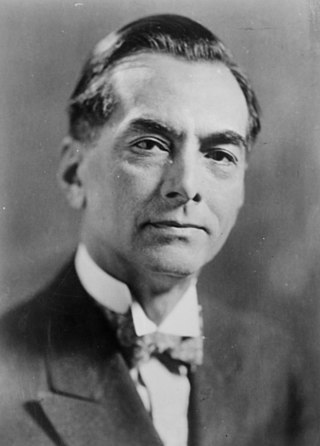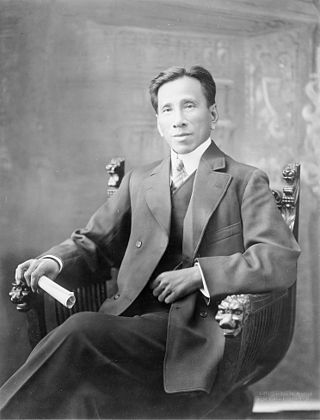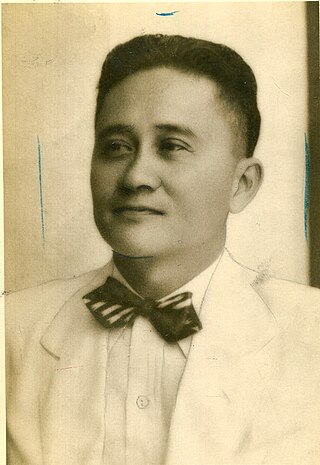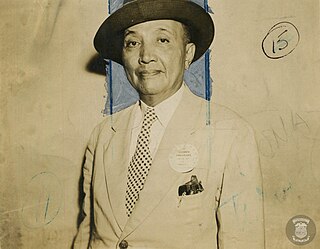
Sergio Osmeña Sr. was a Filipino lawyer and politician who served as the fourth President of the Philippines from 1944 to 1946. He was Vice President under Manuel L. Quezon. Upon Quezon's sudden death in 1944, Osmeña succeeded him at age 65, becoming the oldest person to assume the Philippine presidency until Rodrigo Duterte took office in 2016 at age 71. A founder of the Nacionalista Party, Osmeña was also the first Visayan to become president.

William Cameron Forbes was an American investment banker and diplomat. He served as governor-general of the Philippines from 1909 to 1913 and ambassador of the United States to Japan from 1930 to 1932.

The Philippine Assembly was the lower house of the Philippine Legislature from 1907 to 1916, when it was renamed the House of Representatives of the Philippines. The Philippine Assembly was the first national legislative body fully chosen by elections.

The 1935 Philippine presidential and vice presidential elections were held on September 16, 1935. This was the first election since the enactment of the Tydings–McDuffie Act, a law that paved the way for a transitory government, as well as the first nationwide at-large election ever held in the Philippines.

Session Road is a six-lane 1.7-kilometer (1.1 mi) major road in Baguio, Philippines. The entire road forms part of National Route 231 (N231) of the Philippine highway network.
The Philippine Commission was the name of two bodies, both appointed by the president of the United States, to assist with governing the Philippines.

The first Philippine Assembly elections were held across the Philippines on July 30, 1907. The Philippine Organic Act of 1902 established a bicameral Philippine Legislature composed of the appointed Philippine Commission as the upper house and the elected Philippine Assembly as the lower house.

The Second Philippine Legislature was the meeting of the legislature of the Philippines under the sovereign control of the United States from March 28, 1910, to February 6, 1912.

The Third Philippine Legislature was the meeting of the legislature of the Philippines under the sovereign control of the United States from October 16, 1912, to February 24, 1916.

The Fourth Philippine Legislature was the meeting of the legislature of the Philippine Islands under the sovereign control of the United States from October 16, 1916, to March 8, 1919.

The Taft Commission, also known as the Second Philippine Commission, was established by United States President William McKinley on March 16, 1900, following the recommendations of the First Philippine Commission, using presidential war powers while the U.S. was engaged in the Philippine–American War.
Salvador Araneta y Zaragoza was a Filipino nationalist, constitutionalist, politician, civil servant, lawyer, educator, economist, businessman, industrialist, environmentalist, and philanthropist.

Don Gregorio Soriano Araneta was a Filipino lawyer, businessman, and nationalist, during the Spanish and American colonial periods.

Rafael Palma y Velásquez was a Filipino politician, Rizalian, writer, educator and a famous Freemason. He was a senator from 1916 to 1921 and was the fourth president of the University of the Philippines.

The Insular Government of the Philippine Islands was an unincorporated territory of the United States that was established in 1902 and was reorganized in 1935 in preparation for later independence. The Insular Government was preceded by the United States Military Government of the Philippine Islands and was followed by the Commonwealth of the Philippines.

Pablo Ocampo y de León was a Filipino lawyer, nationalist, a member of the Malolos Congress, inaugural holder of the office of Resident Commissioner from the Philippine Islands to the United States Congress alongside Benito Legarda and a member of the 2nd Philippine Legislature. He gave his service to his country and helped to bring about the peaceful transition of the Philippines from being a colony of Spain for more than 300 years to what will later become the American Commonwealth of the Philippines.

Juan Bautista Alegre y Levantino was a Filipino statesman, a delegate of the first Philippine Independence Mission of 1919 to Washington, D.C., Secretary of the National Committee of the Philippine Independence Commission of 1922, a member of the first Philippine Independence Congress of 1930, and Senator of the Philippines.
The Federalista Party was a political party in the Philippines during the First Philippine Republic and the Insular Government era. It was founded by prominent Filipino politicians such as, Pedro Paterno, Benito Legarda and Felipe Buencamino, among others. It advocated for the Philippines to become a U.S. state.

Vicente de Vera was a Filipino lawyer and politician during the American occupation from Sorsogon.

A special election for the seat of Cavite's at-large district in the Philippine Assembly, the lower house of the Philippine Legislature of the Insular Government of the Philippine Islands, was held on January 19, 1909. This was triggered due to the appointment of the incumbent Rafael Palma as a member of the Philippine Commission. Emiliano Tría Tirona won the special election.
















